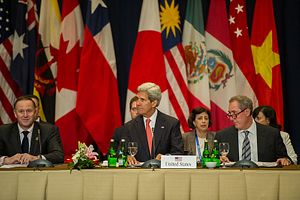As anyone even lightly following this year’s politics in the United States will be aware, trade is not a popular topic in this country these days. The politics of trade don’t bode well for the Obama administration’s signature trade agreement, the recently signed Trans-Pacific Partnership (TPP). Meanwhile, for the other eleven TPP signatories, uncertainty about the United States’ potential inability to ratify the agreement is a great source of anxiety, as Singaporean Prime Minister Lee Hsien Loong most recently articulated while in the United States for a state visit earlier this week.
Facing a recalcitrant Congress, distracted by election-year considerations, the Obama administration has been holding out for a possible ratification of the agreement in the so-called “lame duck” legislative session (the time between election day in November and Obama’s final day in office in January 2017). Congressional support for the agreement, however, is on thin ice, with Obama’s own party largely skeptical of the agreement. (Hillary Clinton, the Democratic nominee, has publicly come out against the agreement in its current form.)
The odds of a lame duck TPP ratification, however, were never all that high. On Tuesday, they got a bit lower as six House Republicans wrote a letter to the White House stating their opposition to having the agreement brought up for ratification in the lame duck session. “Some in your Administration reportedly believe passage of TPP should be attempted following November’s election. We respectfully, but strongly, disagree,” they wrote.
“A ‘lame duck’ Congress should not vote on an agreement of this consequence — it would be an end-run around the American people immediately following an election,” they added. “We urge you not to send TPP implementing legislation to Congress in 2016.” The letter additionally asks Obama to open negotiations on the already-signed TPP, to include provisions barring currency manipulation. Reopening negotiations, however, is a dead end. Singapore’s PM Lee accurately noted on Monday that “nobody wants to reopen the negotiations.” (Lee’s not alone in feeling this way; ask the other signatories and they’ll likely say they same.)
It looks increasingly unlikely that the Obama administration will leave office with the TPP successfully ratified. That’ll leave an unfinished trade agenda to be carried over into the next administration. Should Hillary Clinton triumph in November, there is a chance that she’ll reverse course and soften her stance on the TPP. In particular, should Clinton defeat her opponent Donald Trump, the stalwart anti-trade crusader, in a landslide, she may enter office with the requisite political capital to burn on a full-throated bipartisan push to ratify TPP.
In the case of a closer race or a Trump victory, TPP’s odds don’t look all that good in the short term. The Trump victory scenario all but ensures zero executive branch support for the TPP’s ratification. A Trump administration may even spend its first 100 days campaigning against a motion on TPP ratification. A closer race resulting in a Clinton victory is less straightforward. Given the unpopularity of trade and other urgent matters requiring legislative backing (such as the confirmation of a Supreme Court nominee to fill the long-vacant ninth seat on the Court following Antonin Scalia’s death), TPP ratification may lose urgency.
Clinton, as Obama’s secretary of state and one of the progenitors of the “pivot” to Asia, enthusiastically backed the TPP before she ran for president, leading to accusations that she’d opportunistically flip-flopped out of electoral considerations. She’s been careful not to outright lambaste the deal as unfair or beyond salvage as Trump and her own primary opponent, Bernie Sanders, have done. Clinton has said, for example, that she doesn’t believe TPP is “going to meet the high bar I have set.” It’d cost her political capital, but Clinton, once elected, could revert to her earlier position on trade, assuming the political trade-offs were palatable.
The politics of TPP ratification in the United States are, however, a great source of anxiety for the other eleven states. As I’ve explained before, the requirements baked into the TPP on the agreement’s entry into force ensure that the United States must be on board. In short, all 12 signatories ratify the agreement painlessly, the agreement enters into force 60 days after the last member ratifies it. If all twelve fail to ratify, the agreement still can come into effect if six original signatories, representing 85 percent of TPP country GDP between them, ratify the agreement.
The 85 percent requirement, in particular, means that without the United States, there is no TPP. For the TPP’s other signatories, the agreement’s ratification is a major litmus test for U.S. credibility. Obama, with months left in office, has stressed that he thinks Congress “will ultimately support” the deal, but it’s looking less likely every day that he’ll be the one to convince U.S. lawmakers to do it.

































